FOR IMMEDIATE RELEASE
Contact: Michael Mershon, Director of Advocacy and Communications
202-745-4654
January 6, 2016

FOR IMMEDIATE RELEASE
Contact: Michael Mershon, Director of Advocacy and Communications
202-745-4654
January 6, 2016

Pope Francis is not a liberal or conservative. He transcends pedestrian labels that drive wedges in American society.
So perhaps it trivializes spirituality and religion to keep political score on the pope's visit. But it also might lend instruction and context to some of our raging debates.
So here's how I score it: In the current American political context, Pope Francis was mostly, but not exclusively, left-leaning in his address to Congress on Thursday.
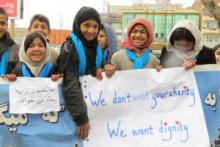
Essentially, when Voices members go to Kabul, our “work” is to listen to and learn from our hosts and take back their stories of war to the relatively peaceful lands whose actions had brought that war down upon them. Before we'd even departed, the news from Afghanistan was already quite grim. Several dozen people were dead in fighting between armed groups. There was a Kabul hotel attack on international businessmen the week before. We earnestly wrote our friends with a last-minute offer to stay away, in hopes that we wouldn't make them targets of the violence. “Please come,” our friends wrote us. So we're here.

The faces of children show us just how foreign to human nature violence actually is. Children shrink from violence. They withdraw inside of themselves, and the face they turn outward to the world is one stripped of their personalities. They lose their affect, are unable to smile or respond to overtures from others. I suppose if you think that joyless, lifeless, blank stares are “normal,” then violence can be thought of as essential to normal human functioning. But if you think that children like this are abnormal — in other words, if you think that violence has prevented them from developing normally — then it’s fair to conclude that violence is anathema to human life and therefore cannot be part of our DNA. Violent behavior must be contingent, just one possibility among others in the vast repertoire of human behaviors. One we can opt for or opt out of as we choose. A choice that a careful study of mimetic theory forces us to face.

What we have yet to hear from Republican presidential candidates or the habitual hawks is the appropriate spiritual response to the war in Iraq — repentance. Instead, we hear this defensive language: “Everybody got it wrong.” Well that’s not true. The people who ultimately made the decision to invade, occupy, and completely destabilize Iraq did indeed get it wrong. But so far, they have been unwilling to admit their incredible mistakes that we all now have to live with: the enormous number of lives lost or permanently damaged; the extremely dangerous exacerbation of the sectarian Sunni/Shia conflict that now rules the entire region; and the creation of the conditions that led to ISIS. Except for Rand Paul, none of the Republican candidates has been willing to admit that ISIS is a consequence of our complete devastation and destabilization of Iraq — leaving us with the greatest real threat the international community has faced for some time. Yet we’ve heard not a word of apology for mistakes or any spirit of repentance from the neoconservative hawks.

JERUSALEM — One out of four Christians today is Pentecostal or charismatic, which means one of every 12 persons living today practices a Pentecostal form of Christian faith. This, along with the astonishing growth of Christianity in Africa, are the two dominant narratives shaping world Christianity today. Further, the gulf between the older, historic churches, located largely in the global North, and the younger, emerging churches in the global South, often fueled by Pentecostal fire, constitutes the most serious division in the worldwide Body of Christ today.
One can also frame this as the divide between the global Pentecostal community, and the worldwide ecumenical movement. Each lives in virtual isolation from the other, and both suffer as a result. I call it ecclesiological apartheid, with its own endless, winding walls of separation. And these walls need to come down, for the sake of God’s love for the world.
It’s become my passion, in whatever small ways, to make some cracks in these walls.

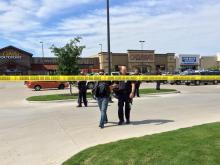
One of the biker gangs is called the “Bandidos.” They originated in Texas during the 1960s. In 2013, federal law enforcement produced a national gang report that identified the Bandidos as one of the five most dangerous biker gang threats in the U.S.
And they have a theology and an anthropology that you should know about. They’re summed up in one of their slogans:
God forgives. Bandidos don’t.
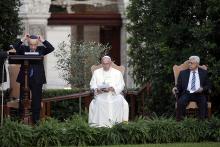
The Vatican’s decision to recognize Palestine as a sovereign state on May 13 angered Israeli officials.
The move comes four days before the first-ever canonization of two Palestinian nuns and it solidifies the standing of Palestinian President Mahmoud Abbas, who is scheduled to meet with Pope Francis at the Vatican on Saturday.
Israeli Foreign Ministry spokesman Emmanuel Nahshon told The Times of Israel that the government is “disappointed by the decision. We believe that such a decision is not conducive to bringing the Palestinians back to the negotiating table.”
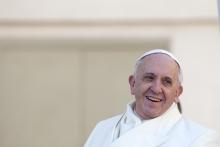
The Vatican announced it will recognize the state of Palestine in a treaty concluded May 13.
The treaty is awaiting formal approval and signing, but it is already being recognized as a major statement of support for a Palestian state in the historically contested region.
The pope has long signaled his support of a state. The language of the treaty, while not yet signed, has alarmed Israelis but invigorated the Palestinian case for statehood, The New York Times reports.
For the past year, the Vatican had informally referred to the country as “state of Palestine,” in its yearbook as well as in its program for Francis’ 2014 visit to the Holy Land.
Formal recognition of a Palestinian state by the Vatican, which has deep religious interests in the Israeli-occupied Palestinian territories that include Christian holy sites, lends a powerful signal of legitimacy to the efforts by the Palestinian Authority’s president, Mahmoud Abbas, to achieve statehood despite the long paralyzed Israeli-Palestinian peace process.
Read more from The New York Times here.
Humanity has successfully banned and eliminated less devastating weapons, but curiously we have come to live with the idea that some countries are entitled to keep nuclear weapons. Worse, we have come to accept that their production is nothing to be ashamed of and that investing in these companies is sound financial practice.
Investing in genocide is inexcusable, and it is time we tell our banks, pension funds, and insurance companies to stop financing the bomb.
To that end, the Dutch peace organization PAX, for which I’m a senior researcher, produces an annual report called Don’t Bank on the Bomb, providing a detailed overview of financial institutions that invest in companies building nuclear weapons. But the report does more: It highlights positive examples of financial institutions actively divesting from nuclear weapons producers, showing that divestment is not only a feasible strategy but also a socially responsible and ethically sound way to watch over the money of clients. Divesting from nuclear weapons is not rocket science.

The arrests of six Minnesota men accused earlier this month of attempting to join the Islamic State group highlights an unprecedented marketing effort being waged by the militant group in Iraq and Syria, U.S. law enforcement officials and terror analysts said.
It’s a campaign that is finding resonance from urban metros to the American heartland.
“This is not so much a recruitment effort as it is a global marketing campaign, beyond anything that al-Qaida has ever done,” said a senior law enforcement official.
The official, who is not authorized to comment publicly, said the Islamic State’s slick multimedia productions, its use of social media, and personal “peer-to-peer” communication are proving to be effective parts of a sophisticated program aimed at the West.
“I don’t think there has been one case in which we haven’t found some connection to the videos or other media the group has produced,” the official said.
Federal authorities have identified more than 150 U.S. residents who have sought to join the ranks of the terror organization or rival groups in Syria. There is evidence that about 40 of those have traveled to the region and returned to the U.S. Most have been charged; an undisclosed number are free and subjects of intense surveillance, the senior official said.
The smallest subset of the group, an estimated dozen, represents those who have actually joined the fighting ranks.
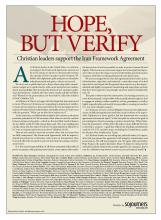
This week, more than 50 Christian leaders came together to voice our support for the framework of a Joint Comprehensive Plan of Action between Iran and the P5+1 nations (the United States, the United Kingdom, France, Russia, China, and Germany), concerning Iran’s nuclear program. Sojourners published the leaders’ statement as a full-page ad in Roll Call, a Washington, D.C., political newspaper widely read by members of Congress and their staff.
The statement, signed by leaders from all the major streams of American Christianity — Roman Catholic, evangelical, mainline Protestant, Orthodox, and Pentecostal — is reprinted below. We want to share this letter with you, the Sojourners community, and the broader public. I urge you to prayerfully consider adding your own voice in support of the diplomatic process and share the opportunity with others. Read it, discuss it in your churches, and add your name. This is a historic opportunity for diplomacy to triumph over armed conflict, and as people of faith, you can play an important role in helping the process succeed.
—Jim Wallis, Founder and President, Sojourners
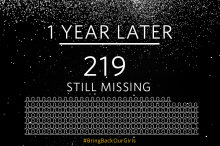
One year after the kidnapping of 276 Nigerian schoolgirls by terror group Boko Haram, more than 200 kidnapped children remain missing.
The kidnapping on April 15, 2014, provoked international outrage and a viral twitter hashtag, #BringBackOurGirls. Many prominent personalities — including First Lady Michelle Obama and comedian Ellen DeGeneres — joined the global outcry, prompting Nigeria to launch a military offensive against the group. Also in the last year, the U.S. military and others have offered Nigeria assistance in finding the children.
But few children to date have escaped from what is widely counted among the most ruthless terror groups operating in North Africa.
According to NBC:
"The Chibok girls were just one group of many, many others who have been kidnapped since last year," said Biu, a woman's rights activist and professor in Maiduguri, Nigeria. "I cannot say that the #BringBackOurGirls campaign has made women and young girls in the northeast feel any safer."
While a few dozen of the Chibok girls have escaped Boko Haram captivity, more than 200 are still missing. To Biu, the international campaign to release the girls did little to bring them home — or stop countless others from being taken since.
Since then, NBC reports, Boko Haram's campaign of terror has continued "largely unabated."
Read more here.
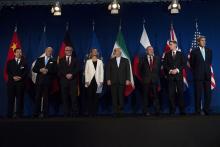
For Christians, Easter is not just a day — it is a season, and, indeed, a way of life. This week is Easter: Monday, Tuesday, Wednesday, Thursday, and so on. Likewise, hope — the message of Easter — is not a feeling, but rather a decision — a choice we make day after day. Hope isn’t easy, but the decision to hope keeps the world going.
Now we have a choice to make: a decision whether to pursue a tough diplomatic process for peace to prevent Iran from developing a nuclear weapon. The United States and Iran — along with the U.K., Germany, France, Russia, and China — now have the beginning framework of a deal that could accomplish just that. But we would have to give it a chance. Much has to be worked out by the June 30 deadline, and it won’t be easy.
Should we give this hope for peace a chance? I believe Christians should answer yes. Here’s why.
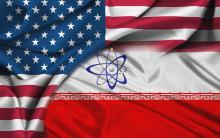
The United States and Iran agreed to a preliminary deal on Iran's nuclear program today, Politico reports. The hotly anticipated deal, following stop-and-start negotiations and vocal concern from Republicans and Israeli Prime Minister Benjamin Netanyahu, will include Iran dismantling two-thirds of its centrifuges and allowing rigiourous inspections by the IAEA through 2035 and beyond. In exchange for Iran's compliance, the U.S. and the E.U. will lift longstanding economic sanctions.
President Obama was optimistic but pragmatic, saying the plan was a "good deal," according to Politico:
"'[It is] a historic understanding with Iran which, if implemented, will prevent it from obtaining a nuclear weapon. I am convinced that if this framework leads to a final deal, it will make our country and the world safer,' Obama said in a statement in the White House Rose Garden. The deal would 'cut off every pathway that Iran could take to develop a nuclear weapon.'
... Obama stressed in particular the inspection and verification aspects of the agreement. 'If Iran cheats, the world will know it. If we see anything suspicious, we will inspect it,' Obama said.
...'If there is backsliding on the part of the Iranians,' he said, 'there will be no deal.'"
The Win Without War coalition called the preliminary deal "huge news" in a statement, also released today:
"At a time when much of the Middle East is engulfed in war, the United States is on the verge of achieving one of our most pressing national security goals without dropping a single bomb. Today's progress towards a comprehensive, historic agreement between Iran, the United States, and our P5+1 partners not only ensures that Iran will not get a nuclear weapon, but it demonstrates precisely how America can win without war."
Details of the plan are anticipated in late June. Read more at Politico.

THIS YEAR MARKS multiple 50th anniversaries of the U.S. escalation of the war in Vietnam and the beginning of major anti-war protests. To mark the anniversary of the war, the Pentagon is sponsoring an official, multimillion dollar Vietnam War Commemoration to “thank and honor veterans.” This program has been criticized as a Vietnam whitewash and an attempt to rewrite history. The Pentagon commission will sponsor more than 1,000 events around the country that will have the effect of honoring the military and obscuring, behind a façade of false patriotism, the painful truths of the Vietnam War.
The Pentagon’s commemorations are missing any consideration of critical unlearned lessons, such as: 1) the Vietnam War was unjust and never should have been fought, 2) wars of military intervention have failed and should be avoided, 3) militarism and war have corrupted U.S. political decision-making, and 4) diplomacy, development, and peacebuilding strategies are preferable and more effective means of resolving international conflict.

Anti-Semitic incidents in the U.S. spiked 21 percent last year, according to the Anti-Defamation League, unsettling many American Jews who had thought that hatred of Jews and Judaism was on the decline, at least here at home.
The ADL has released a spring report for the past 10 years that showed fewer incidents targeting American Jews. That downward trend contrasted sharply to the rising tide of anti-Semitism in Europe — recently witnessed in the January killings of four Jews at a kosher supermarket in Paris.
“The United States still continues to be unique in history” as a safe place for Jews, said Abraham Foxman, the ADL’s national director.
But this new ADL report casts a shadow on the idea that the U.S., which is home to more than 40 percent of the world’s Jews, stands in stark contrast to European anti-Semitism and far higher levels of antipathy against Jews in the Middle East, as reflected in studies of anti-Semitic attitudes worldwide.
“It’s still different here than anywhere else, but don’t take anything for granted, and be concerned,” Foxman said.
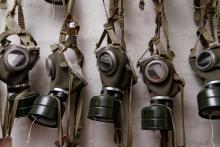
Setsuko Thurlow was 13 when “progress” came to Hiroshima in a white-hot flash. In the dark silence following the nuclear bomb blast, Thurlow recalls children crying, “Mama, help me. God, help me.”
Her sister lived for four days. Many of her 351 dying schoolmates “looked like skeletons with skin hanging from their bones.”
They perished in agony.
Today, Thurlow and other survivors travel the globe, sharing their stories with a new generation for which nuclear weapons are an afterthought — seemingly a hypothetical and abstract threat.
The end of the Cold War had a mixed effect on the nuclear equation. Through dogged diplomacy and effective institutions, disarmament continues, though at a slower pace in recent years. There are now 10,000 operational nuclear warheads in the world, down from a high of 64,000 in 1986.
But the specter of nuclear terrorism and regional conflicts between nuclear weapons states makes nuclear weapons even more dangerous in our international system. Deterrence theory, which governed strategic thinking during the Cold War, is a much less compelling framework today.
Thankfully, most states have forsworn these armaments. Nuclear weapons are not vital to any state’s legitimate security interest. No state or NGO has the capacity to respond to the unfathomable humanitarian crisis that would follow an accidental or intentional use of a nuclear weapon.
Thus a growing global consensus now acknowledges the extreme risk nuclear weapons pose.
Pope John XXIII stated unequivocally in his 1963 encyclical “Pacem in Terris,” “Nuclear weapons must be banned.”

The Friendly Atheist is one of the most influential atheist blogs on the Internet. The website’s 10 bloggers have contributed to CNN, Fox and Friends, NPR, the Washington Post, and the USA Today.
You may be surprised to read this, but I owe the Friendly Atheist a personal debt. My atheist brother invited me to officiate at his wedding ceremony with this condition, “As long as you don’t say anything about God.” I’m very close with my brother, so of course I agreed. I wrote the majority of the wedding ceremony with no problem. I easily secularized everything else, but was stymied by how to secularize the final blessing.
Since Google has all the answers, I typed the words “secular wedding ceremony blessing” into my search engine. The first link that appeared was the Friendly Atheist’s article “ A Secular Wedding Ceremony from Start to Finish.” The entire transcript for the secular wedding is beautiful. As I spoke the words of the Friendly Atheist’s final blessing, I experienced a profound sense of awe:
May the glory which rests upon all who love you, bless you and keep you, fill you with happiness and a gracious spirit. Despite all changes of fortune and time, may that which is noble and lovely and true remain abundantly in your hearts, giving you strength for all that lies ahead.
My brother and his wife expressed their appreciation for those words. My dad, a devout Christian, said it was the perfect capstone to the wedding. And all I could think were words of gratitude. “Thank God for the Friendly Atheist,” I said to myself.